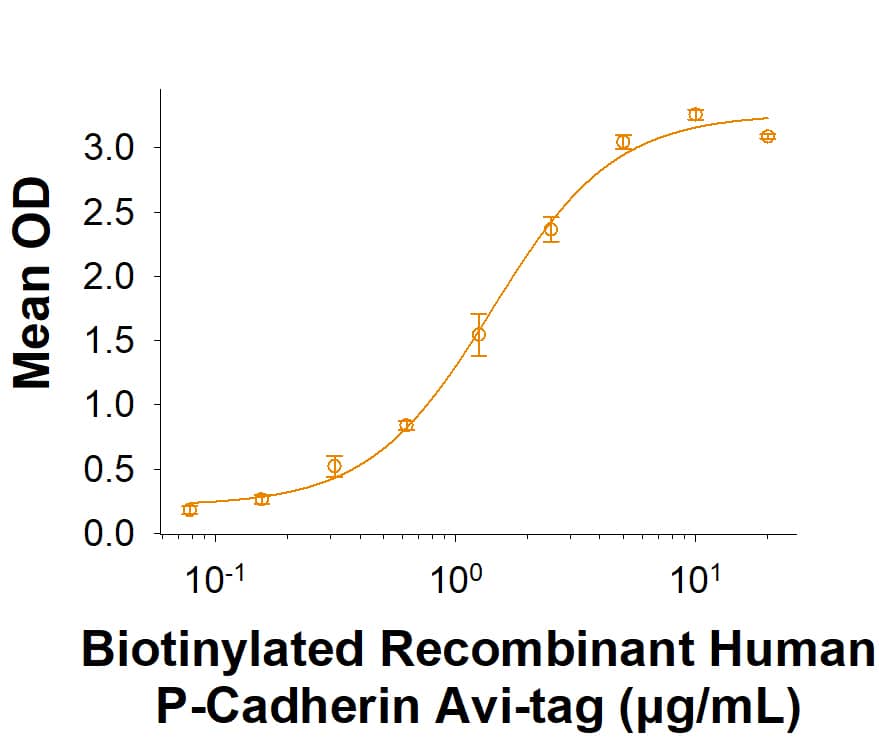Recombinant Human P-Cadherin Fc Chimera Avi-tag Protein, CF New
Recombinant Human P-Cadherin Fc Chimera Avi-tag Protein, CF Summary
- R&D Systems HEK293-derived Recombinant Human P-Cadherin Fc Chimera Avi-tag Protein (AVI11651)
- Quality control testing to verify active proteins with lot specific assays by in-house scientists
- All R&D Systems proteins are covered with a 100% guarantee
Product Specifications
| Human PCAD (Asp108-Gly654) Accession # CAA45177.1 | IEGRMDGG | Human IgG1 (Pro100-Lys330) | Avi-tag |
| N-terminus | C-terminus | ||
Analysis
Product Datasheets
AVI11651
Carrier Free
CF stands for Carrier Free (CF). We typically add Bovine Serum Albumin (BSA) as a carrier protein to our recombinant proteins. Adding a carrier protein enhances protein stability, increases shelf-life, and allows the recombinant protein to be stored at a more dilute concentration. The carrier free version does not contain BSA.
In general, we advise purchasing the recombinant protein with BSA for use in cell or tissue culture, or as an ELISA standard. In contrast, the carrier free protein is recommended for applications, in which the presence of BSA could interfere.
AVI11651
| Formulation | Lyophilized from a 0.2 μm filtered solution in PBS with Trehalose. |
| Reconstitution | Reconstitute at 200 μg/mL in water. |
| Shipping | The product is shipped at ambient temperature. Upon receipt, store it immediately at the temperature recommended below. |
| Stability & Storage: | Use a manual defrost freezer and avoid repeated freeze-thaw cycles.
|
Scientific Data
 View Larger
View Larger
Biotinylated Recombinant Human P-Cadherin Fc Chimera Avi-tag Protein (Catalog # AVI11651) binds Recombinant Human CDCP1 Fc Chimera (10402-CU) with an ED50 of 0.500-7.00 μg/mL.
 View Larger
View Larger
2 μg/lane of Biotinylated Recombinant Human P‑Cadherin Fc Chimera Avi-tag Protein (Catalog # AVI11651) was resolved with SDS-PAGE under reducing (R) condition and visualized by Coomassie® Blue staining, showing bands at 103-130 kDa.
Background: P-Cadherin
Placental (P) - Cadherin (PCAD) is a member of the Cadherin family of cell adhesion molecules. Cadherins are calcium-dependent transmembrane proteins, which bind to one another in a homophilic manner. On their cytoplasmic side, they associate with the three catenins, alpha, beta, and gamma (plakoglobin). This association links the cadherin protein to the cytoskeleton. Without association with the catenins, the cadherins are non-adhesive. Cadherins play a role in development, specifically in tissue formation. They may also help to maintain tissue architecture in the adult. P-Cadherin is a classical cadherin molecule. Classical cadherins consist of a large extracellular domain which contains DXD and DXNDN repeats responsible for mediating calcium-dependent adhesion, a single-pass transmembrane domain, and a short carboxy-terminal cytoplasmic domain responsible for interacting with the catenins. Human P-Cadherin is an 829 amino acid (aa) protein with a 26 aa signal sequence and an 803 aa propeptide. The mature protein begins at aa 108 and has a 548 aa extracellular region, a 23 aa transmembrane region, and a 151 aa cytoplasmic region. The human and mouse mature PCAD proteins share 87% homology. Our Avi-tag Biotinylated human P-Cadherin Fc Chimera features biotinylation at a single site contained within the Avi-tag, a unique 15 amino acid peptide. Protein orientation will be uniform when bound to streptavidin-coated surface due to the precise control of biotinylation and the rest of the protein is unchanged so there is no interference in the protein's bioactivity.
- Shimoyama, Y. et al. (1989) J. Cell Biol. 109:1787.
- Bussemakers, M.J.G. et al. (1993) Mol. Biol. Reports 17:123.
- Overduin, M. et al. (1995) Science 267:386.
- Takeichi, M. (1991) Science 251:1451.
- Nose, A. et al. (1987) EMBO J. 6:3655.
FAQs
No product specific FAQs exist for this product, however you may
View all Proteins and Enzyme FAQsReviews for Recombinant Human P-Cadherin Fc Chimera Avi-tag Protein, CF
There are currently no reviews for this product. Be the first to review Recombinant Human P-Cadherin Fc Chimera Avi-tag Protein, CF and earn rewards!
Have you used Recombinant Human P-Cadherin Fc Chimera Avi-tag Protein, CF?
Submit a review and receive an Amazon gift card.
$25/€18/£15/$25CAN/¥75 Yuan/¥2500 Yen for a review with an image
$10/€7/£6/$10 CAD/¥70 Yuan/¥1110 Yen for a review without an image
